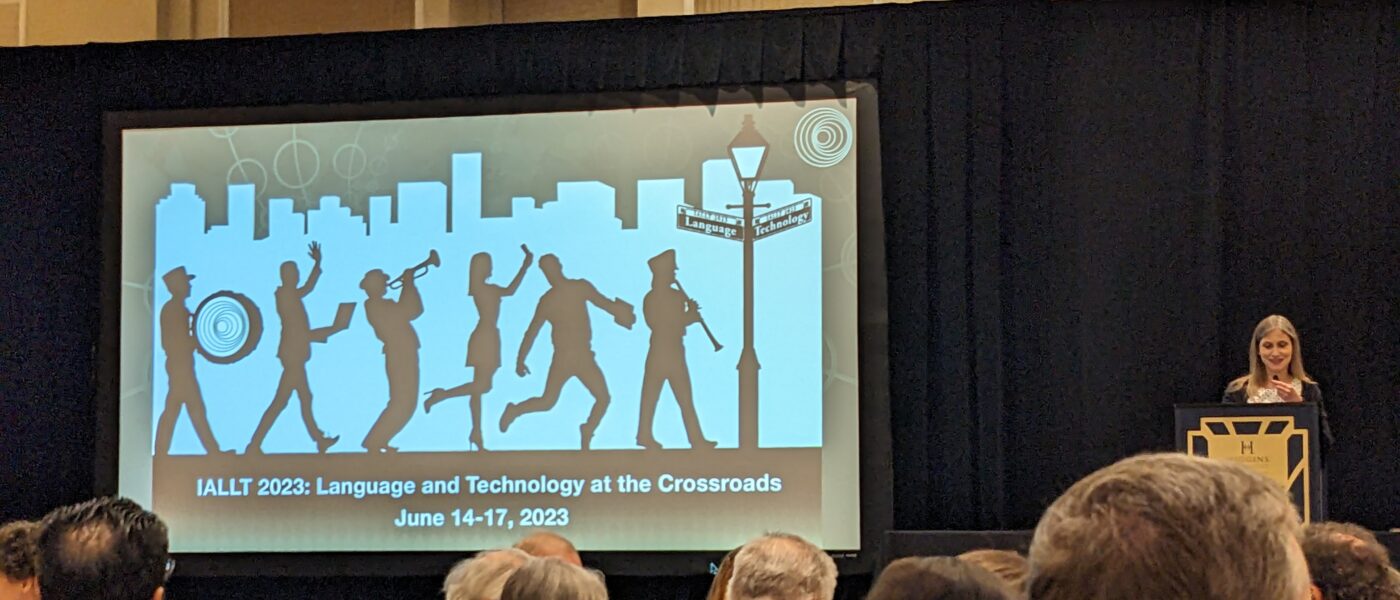IALLT 2023 Conference Report
By Amanda Romjue, Emory & Henry College; Kayla Louise Soares, University of Rhode Island; Lillian Jones, University of California, Davis; Xueyan Sherry Duan, University of Rochester, New York
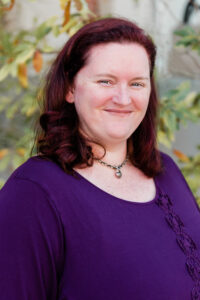
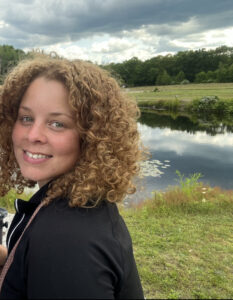
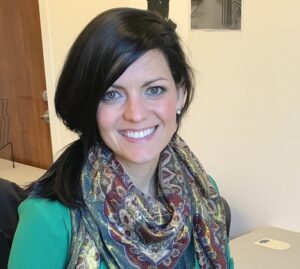
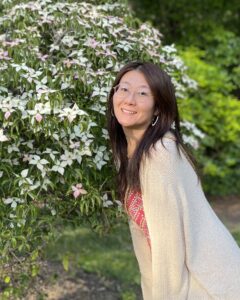
DOI: https://www.doi.org/10.69732/CCJQ7389
The International Association of Language Learning Technology (IALLT) conference, IALLT 2023: Language and Technology at the Crossroads, took place June 14-17, 2023 at The Higgins Hotel and Conference Center in New Orleans, Louisiana. It had been four years since the IALLT family had gathered in person and everyone seemed to have a wonderful experience getting back together and reconnecting after the IALLT 2021 virtual conference.
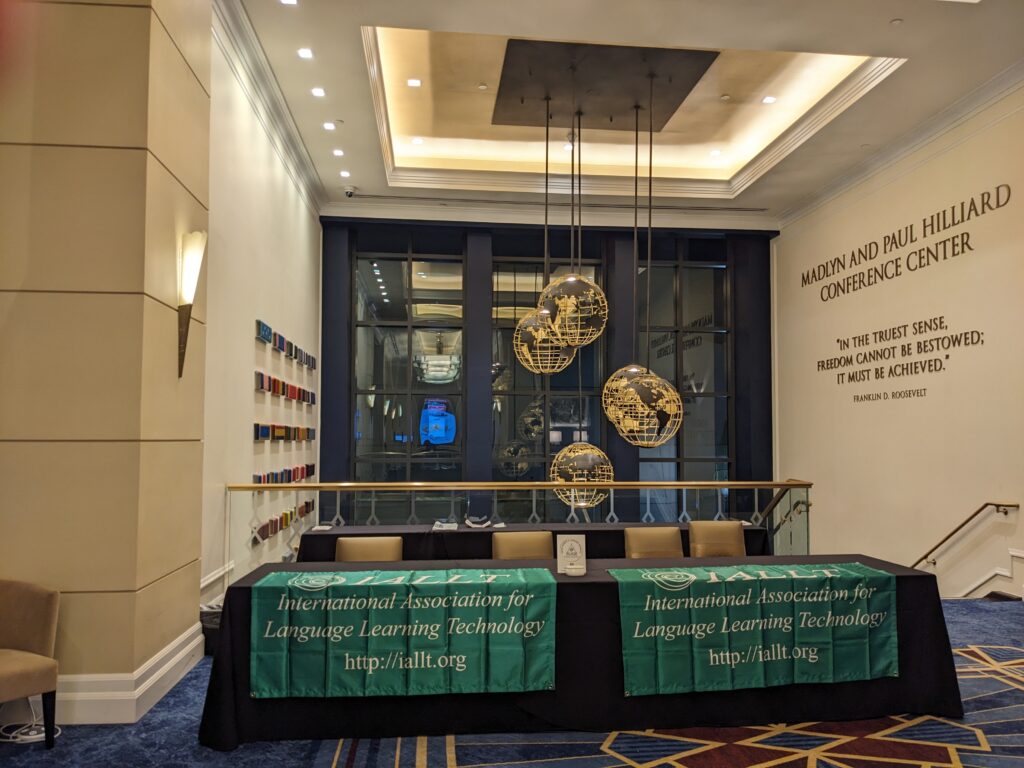
Laura Plantation Tour
As a pre-conference activity, IALLT offered an eye-opening excursion to Laura Plantation, Louisiana’s Creole Heritage site. Being rated one of the best history tours in the United States by Lonely Planet Travel, the guide not only gave a vivid explanation of the sugar plantation, but enlightened us with the jaw-dropping drama of the four generations of Laura Locoul’s family who were associated with the household. Most importantly, this tour truly gave a glimpse into the lives of enslaved people with accounts and records from the different time periods. The property tour included a visit to the plantation household, the grounds, and the slave quarters. Additionally, there was a touching museum as well as a gift shop.
IALLT Welcome Reception
The IALLT Welcome Reception was held on Wednesday night at Rosie’s on the Roof. Many of the attendees were dressed in Rosie the Riveter inspired garb. IALLT shared Mardi Gras beads and themed party favors. It was a lovely chance to start reconnecting with the IALLT family and to make new friends.
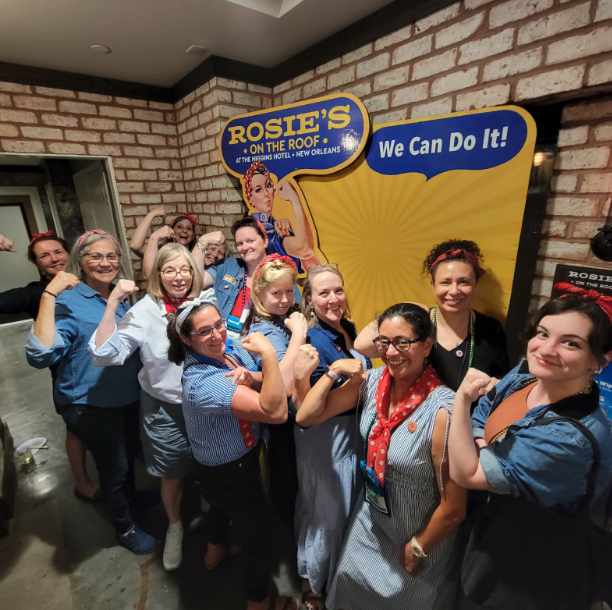
Photo credit: Lauren Rosen
IALLT Board and Council Meeting
The IALLT Board and Council meeting was a great opportunity to connect with IALLT leadership and learn about opportunities to get involved with the organization such as the Scenic Route mentorship program. Board and Council meeting minutes will be available on the IALLT website.
Henderson Plenary – Iowa Intersections
Claire Frances from the University of Iowa presented “Iowa Intersections: A Multilingual Narrative Project,” a project she implemented centered on building a bridge between the language center and the community. She mapped out the entire project in phases and provided images and videos detailing the impact this project had on the community. Her process included steps such as investigating the multilingual communities of Iowa, learning the how-to’s of oral history methodologies, and building a team of graduate and translation students. The end result consisted of intriguing videos where community members were able to tell their stories in their native language with the help of meaningful video imagery. The Iowa Intersections project not only built a sense of community, but provided real-life materials in the target language for lower level courses.
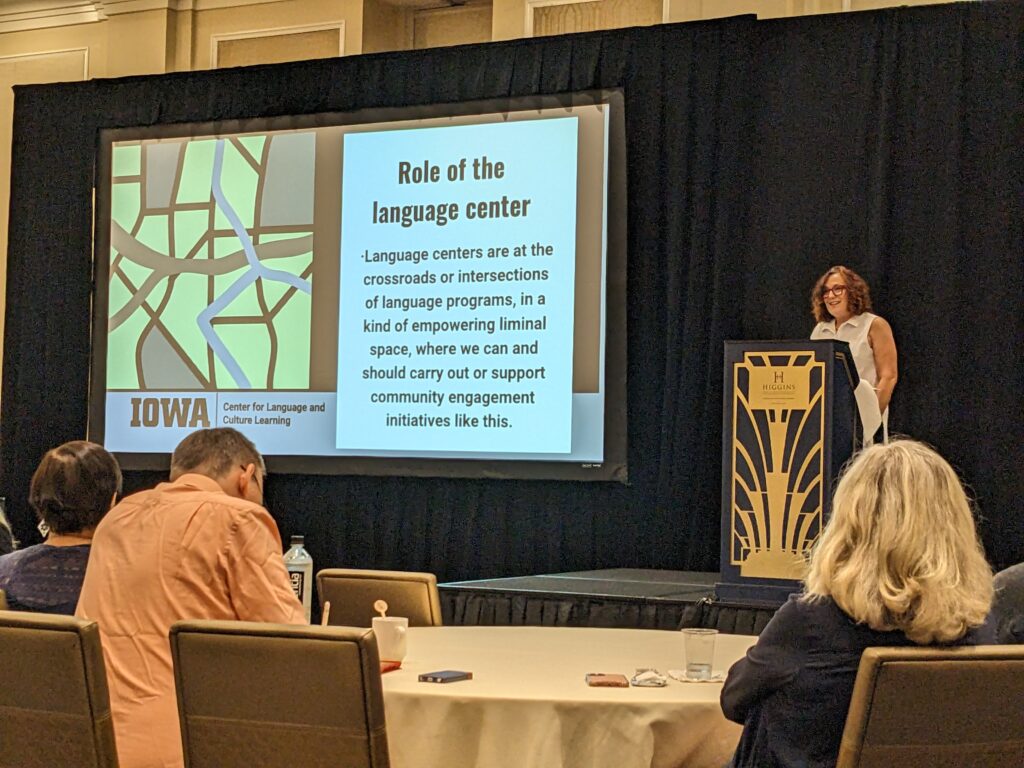
Photo credit: Shannon Donnally Quinn
Keynote – Louisiana’s French and Creole Heritage
The keynote speaker, Joseph Dunn, gave a presentation entitled “Louisiana’s French and Creole Heritage Languages in the Age of Technology” in which he advocated for a perspective on French in Louisiana as a language currently in use. He mentioned that there is a stereotype that only older people speak French in Louisiana and that there is a disconnect between what the university curriculum included and what students needed to learn to use French. Participants learned about Louisiana French and the distinction between the terms “Cajun” and “Creole.” He shared many resources and videos that featured speakers of Louisiana French. It was a wonderful keynote presentation that contextualized the location of this year’s conference.
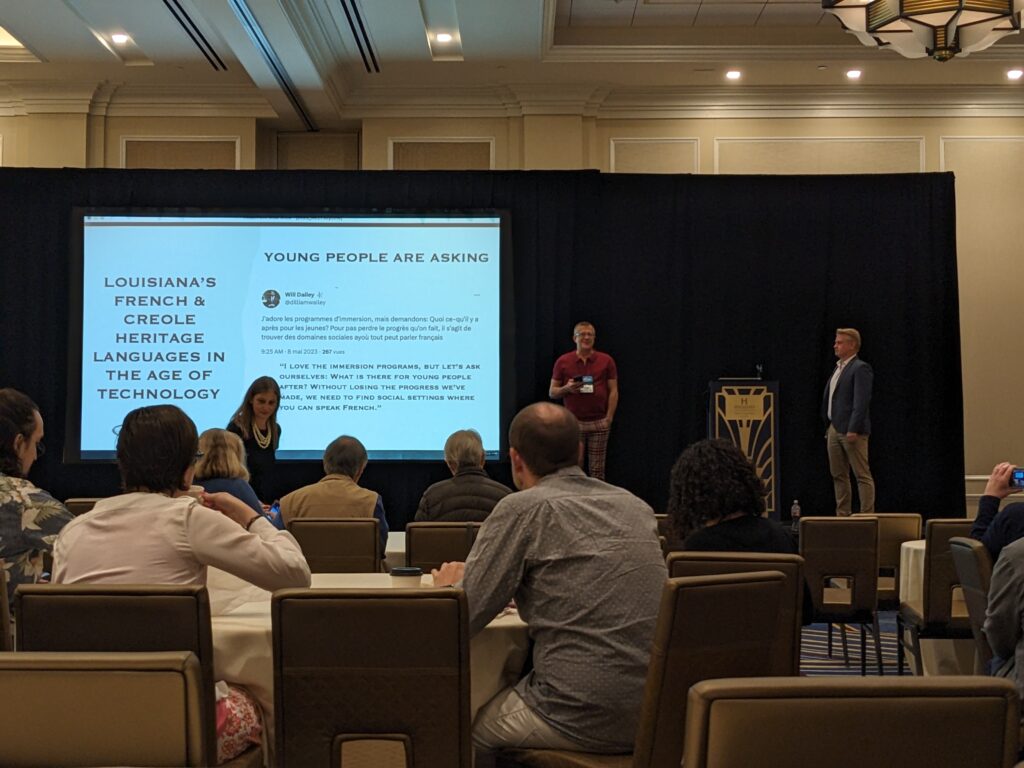
Photo credit: Shannon Donnally Quinn
Workshops and Sessions
This year’s conference featured five pre- and post-conference workshops and more than 80 sessions and meetings. While the full extent of professional learning is beyond the scope of this report, we wanted to highlight some of the sessions that stood out in our minds. These include sessions on language centers, online translators, open educational resources, virtual reality, and ChatGPT. There were also sessions about getting involved with IALLT.
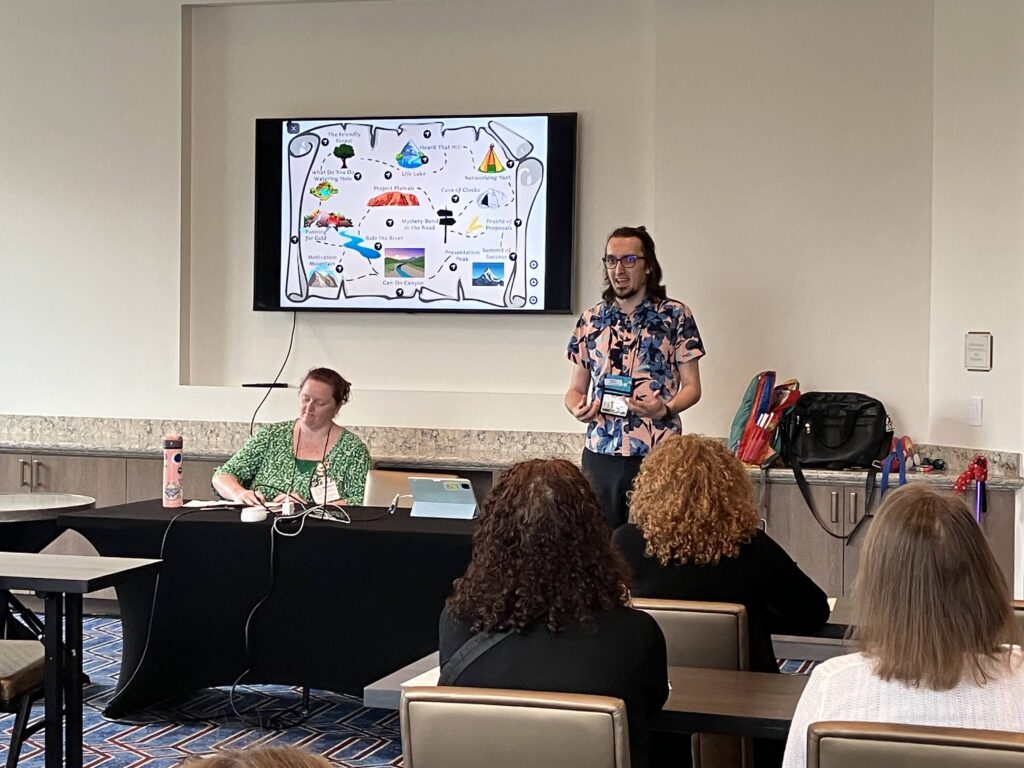
Photo credit: Sherry Maggin
Language Centers
Although this year’s conference had a multitude of topics, there was no lack of sessions for those who needed their biannual dose of language center fun, both for newbies and veterans! Several of the presentations gave much needed advice on how to transform a language center and keep it alive, as well as on how to build community by making it the place to be. Alessia Dalsant discussed the evolution of the Center for Languages and International Collaboration (CLIC) at Bentley University. In her session, Dalsant highlighted changes that were made to transform the language lab to a language center. A few of those changes included focusing on professional development, incorporating requirements for students to attend CLIC events or sessions into all syllabi, and creating task forces based on student interest.
Christopher Cirefice and David Shultz introduced the platform Notion for scheduling and documentation, staff management, training resources, etc. Being rather easy to use, this platform can help save time and track data. Marie Schein emphasized the importance of keeping your language center open and relevant throughout the year while focusing on promotion tactics and holding events such as karaoke and trivia. Helen Stapleton highlighted the building of the language center community through workout classes, video games, and even a passport that encourages students to attend language center events. Additionally, there was a wonderful session on the career paths of several panel members involved in language centers. They offered advice on specific tools to improve one’s own value in the field and also discussed career changes and advancements that could come to fruition with the skills developed in the language center field.
To put the icing on the cake, on the last day of the conference, Felix Kronenberg held his Language Center Design workshop, with the help of Arielle Akines. While this workshop was a wonderful refresher for those with language center experience, it was also extremely eye-opening for those new to the field and it provided a path to hit the ground running.
As these were all amazing, informative sessions, it is also important to note that the scope of what was offered regarding language centers goes beyond what’s included in this section.
Online Translators
Errol O’Neill from the University of Memphis hosted a timely and helpful session on research and practical application for using Online Translators (OTs) to inform instructor’s OT policies in both face-to-face and fully online courses. The discussion covered the prevalence of student use of OTs both pre-, during, and post-pandemic, and included helpful distinctions between using online translators and Chatbots. One of the key takeaways of this presentation was the suggestions for approaches and policies for integrating OTs in the classroom, including survey and reflection, guided used of Machine Translation, and the suggestion to follow an ADAPT (amend, discuss, assess, practice, and train) or Situate, Investigate, Integrate model. In his own work, O’Neill uses a 5-step approach for training in responsible OT use: introduction, demonstration, hands-on testing, review, and policy. He also suggests that policies should include checklists for comparison, a discussion of academic integrity and responsible use, and Mega Prompts. Resources were also abundant in this presentation, including providing the attendees several articles, example policies, and sample syllabus statements. Attendees also had the chance to break off into small groups to discuss their own experience with OT policies in their own classroom.
Open Educational Resources (OER)
Open Educational Resources (OER) was also a prevalent theme at the 2023 IALLT Conference. For example, in her presentation titled “Going Rogue: OER and the Language Classroom” Laurie Massery presented research and application about how OER can enhance the learning of specifically Gen Z students. One of the reasons that Massery draws upon for this success is the affordance of OER to allow instructors to create a variety of multimodal methods for students to engage in learning material (often free of charge). Understanding the unique ways that different generations consume information is essential and OER can reflect different learning styles through offering a variety of ways for students to engage in the content. Specifically, Massery notes how, in general, Gen Z has shorter attention spans and expects instant feedback and rapid results and answers (Colliers, 2017); and building course content through custom OER platforms can be an effective way to reach a different generation of learners.
Similarly, Nina Langton also highlighted the effectiveness and value in OER in her work to indigenize Ainu language and culture through using Pressbooks and H5P. Langton presented several examples of the integration of H5P activities in a custom Presbooks site, including working with vocabulary, grammar, and geography, interactive video exercises, and pre-, during, and post-reading comprehension activities. Both Massery and Langton discussed how OER affords open publishing in two realms: 1) when the instructor is the owner/creator of the OER site, they can publish their students’ work, and 2) the ability to embed original videos allows potential use of authentic and original videos (with the original producer’s permission).
Virtual Reality and ChatGPT
Virtual Reality was a hot topic at this year’s IALLT conference and one prominent presence was the innovation and advancement made by Scott Cardwell’s team at ImmerseMe. In his presentation “ImmerseMe – Harnessing Virtual Reality and ChatGPT in Authentic Virtual Homestay Experiences Across all Levels” Cardwell showcased several aspects of ImmerseMe, a web-based virtual reality (VR) and artificial intelligence (AI)-powered language learning tool. This presentation showcased a multitude of ways to leverage the tool for student learning, including pronunciation practice, grammar and vocabulary training, and translation. One key feature of ImmerseMe is how students can practice various linguistic concepts while navigating a virtual context through authentic video which was captured from a real world situation, in the country where the target language is spoken. This authenticity and multimodal affordance may increase student engagement and motivation. Another intriguing point which emerged from the discussion was the cost and pricing structure of tools such as ImmerseMe. Several contributions from the session participants offered innovative ideas which may be of interest for instructors, product designers, and company founders, including potentially integrating the cost in the course fee and/or working directly with publishers of educational content such as LMS providers.
Aside from ImmerseMe, IALLT provided a platform for numerous presentations and discussions on the transformative impact of AI, AR, and VR technologies in teaching and learning. Educators showcased a progression in their integration of these technologies, ranging from substitution of traditional platforms to modification and even redefinition of instructional practices.
During an IOWA session on ChatGPT, participants explored its use in higher education language classrooms. This session emphasized how ChatGPT can effectively replace traditional grammar correction methods and facilitate the creation of course materials. Additionally, another session highlighted Meta-verse, an AR platform that significantly increased content-learner interactions. By transforming vocabulary content into an engaging AR game, students were immersed in linguistic scenarios where they had to select the appropriate words. This approach not only enhanced student engagement but also catered to diverse learning styles. Furthermore, a VR platform named KUULA was introduced in a separate session, providing language learners and those interested in a foreign country with authentic and rich environments as stimuli for immersive exploration.
Moreover, the IOWA team’s presentation on ChatGPT proposed modifying the usage of ChatGPT in language classrooms. They encouraged language professors and students to create and augment models across various genres and levels, employing different question formats such as multiple-choice and discussion questions. Additionally, sessions on ChatGPT’s voiced TAs and the VR platform MAGE DULE showcased their potential in redefining the creation and facilitation of scaffolded input, target output, adaptive interaction, and corrective feedback.
These examples illustrate the wide-ranging possibilities offered by AI, AR, and VR technologies in language education. Educators are embracing these tools, moving beyond mere substitution to explore innovative ways to enhance language teaching and learning experiences.
Old Coots
One testament to the meaning of IALLT for many people is the fact that quite a few people returned to the conference even after their retirement. In the “Old Coots” session, both older and newer IALLT members connected to friends and colleagues in the room and via Zoom.
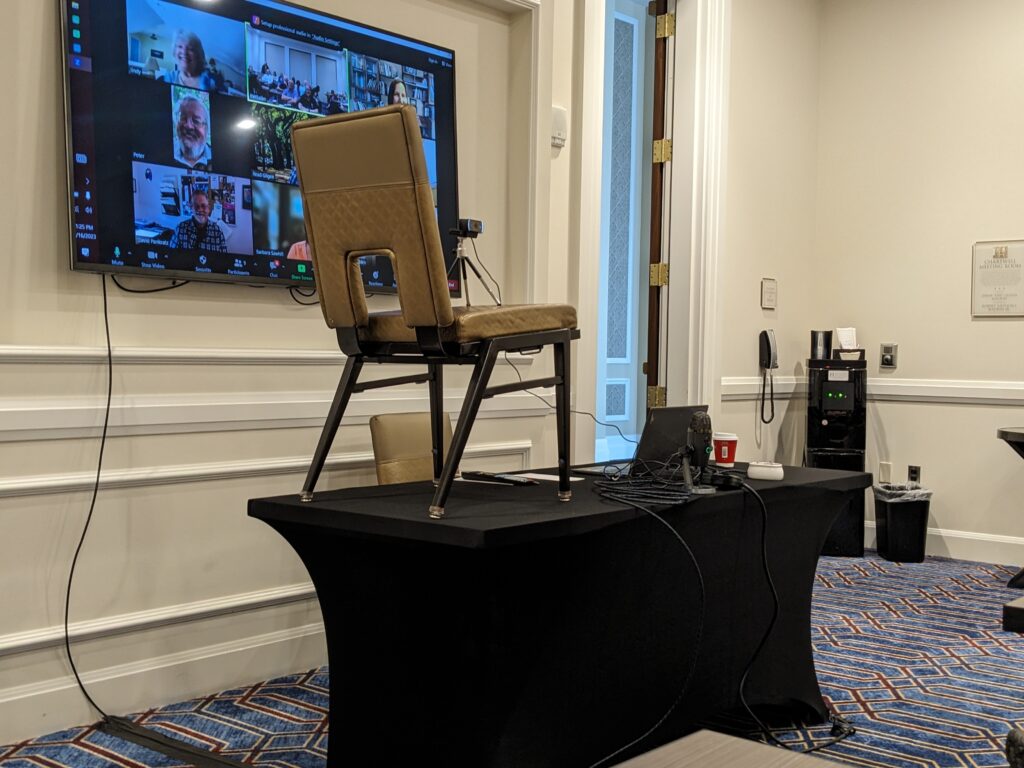
Photo credit: Shannon Donnally Quinn
IALLT Banquet and Business Meeting
At the Friday night IALLT Banquet and Business Meeting, outgoing IALLT President Angelika Kraemer and incoming IALLT President Dan Nickolai kept the crowd entertained during their brief remarks, which included announcing our next conference: FLEAT VIII, which will be held in Hawaiʻi in the summer of 2025! Many IALLT members were honored at the event for their dedicated service to the organization. The Ruth Trometer Lifetime Achievement Award was presented to Sharon Scinicariello and Mike Ledgerwood. The Harold H. Hendricks Award for Sustained Leadership in IALLT was presented to Shannon Donnally Quinn. The Robert Henderson Memorial Award went to Sherry Maggin. The Marie Sheppard Memorial Award was presented to Wenjing Huang. The Robert Henderson Plenary Award recipient was Claire Frances.
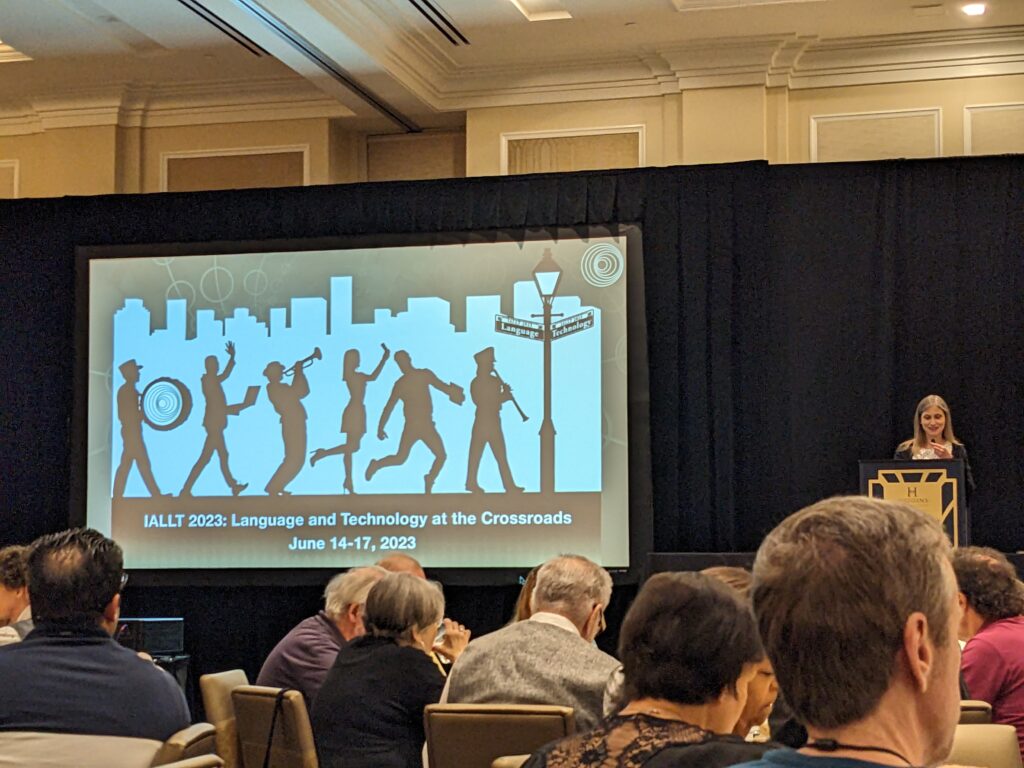
Photo credit: Shannon Donnally Quinn
Angelika sang and danced in honor of Stacey Powell, IALLT Treasurer and Conference Coordinator, and awarded her the special President’s Award. No one could be more deserving of such an honor. Stacey Powell, Conference Coordinator, and Styx, Commercial Partners Coordinator, are the reason we have IALLT conferences. From scoping out the venues to managing the details, they ensure everything comes together to guarantee we have the best possible conference experience.
Five Ursula Willams Graduate Student Conference Grants were awarded. The recipients were Samanta Buffa, John Gibbons, Lillian Jones, Alona Kladieva, and Nico Norris. The K-12 Educator Conference Grant was awarded to Wenjing Huang. There were also two new awards granted this year by The FLTMAG, Best Contribution to The FLTMAG by a Graduate Student and by a K-12 Teacher. These were awarded to Cemil Gökhan Karacan and Elif Mollamehmetoğlu, and Amanda Ferris and Wenjing Huang, respectively. Congratulations to all the award winners!
Of course no banquet is complete without food and cocktails. The banquet featured delicious locally-inspired foods such as a bourbon glazed chicken jus and fried catfish. The evening concluded with the return of the Talking Stick ceremony in which one of IALLT’s most treasured artifacts is passed from the current conference host to the next one. In this case, the Talking Stick passed from the Conference Chair, Georges Detiveaux, to the outgoing IALLT President, Angelika Kraemer, to the incoming IALLT President, Dan Nickolai, and finally to the Conference Coordinator, Stacey Powell.
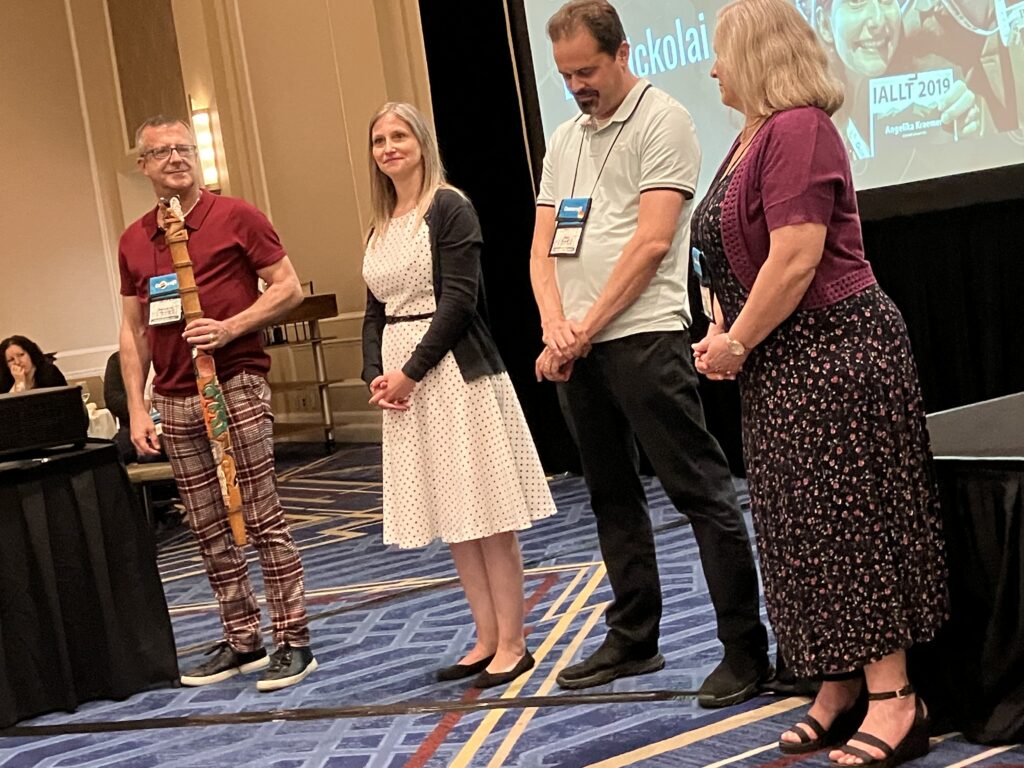
Photo credit: Sherry Maggin
IALLT Closing Dinner
The closing dinner at Mother’s Next Door was a truly magnificent experience. We ate the most delicious food New Orleans has to offer including crawfish etouffée, seafood gumbo, and jambalaya, to name a few. While we ate, guests were entertained by the close-up magic of local magician, Dante, and they also had the opportunity to be drawn as a caricature by a local New Orleans artist. Overall, it was another wonderful event in which the IALLT family came together and celebrated with lots of IALLT hugs to close out another conference year.
Jazz Brunch Cruise on Paddlewheeler Creole Queen
New this year, we had the opportunity to experience an after-conference special event, a tasty brunch aboard the Paddlewheeler Creole Queen. The boat cruise took us down the Mississippi River while we listened and danced to authentic New Orleans jazz and enjoyed an expansive selection of food, including New Orleans barbecued shrimp, creamy grits, and chicken and andouille gumbo. It was a wonderful way to finish off a wonderful week.
Thank you!
We conclude our report with our gratitude. There would be no conference without our generous sponsors and exhibitors. A special thanks goes out to Boomalang, ImmerseMe, Klett World Languages, Mango Languages, the National Less Commonly Taught Languages Resource Center (NLRC) at Michigan State University, Avant Language Assessment and Professional Learning Solutions, Lingostar.ai, the MAFLT program at Michigan State University, Yabla, Conversifi, Swivl, and SEALLT for their contributions and participation.
See you in Hawaiʻi in 2025!
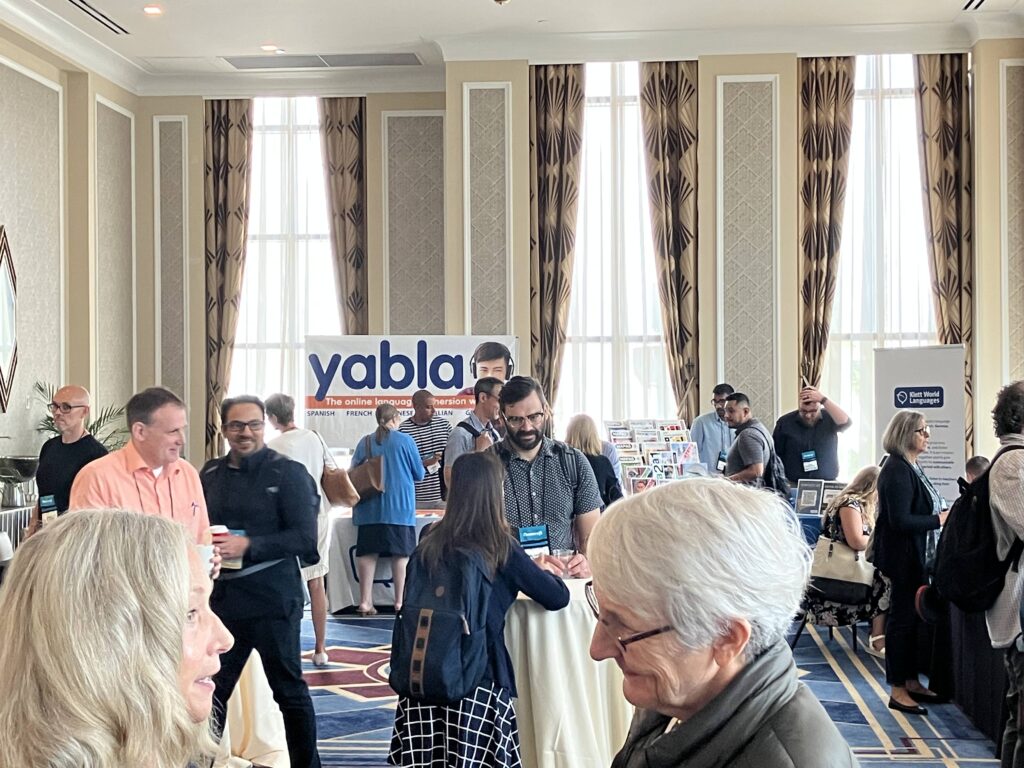
Photo credit: Sherry Maggin

